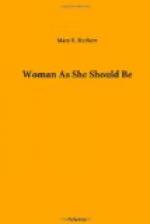They expected very shortly to have returned home, and he had anticipated so much pleasure in that return. He had never analyzed the source of that pleasure, but now that it was removed, he saw it too clearly; it was the hope, the expectation, of meeting with her. He recalled to mind the hours he had passed with her,—happy hours, all too quickly flown; her winning smile, the sweetly persuasive tones of her voice, her earnest and thoughtful manner, all came back to haunt him with their memory. Oh, how distinctly he remembered one of the last conversations he had with her, when, in her own mellifluous tones, she had repeated Young’s exquisite lines,—
“Stricken
friends
Are angels sent on errands
full of love,—
For us they languish, and
for us they die.”
Never had he felt their beauty as now, for the storm of passion had in a measure subsided, and the still small voice of conscience once more asserted its power.
“Oh, Agnes, Agnes,” he murmured, “you tarried on our earth as an angel of light, and now you have but returned to your native sphere, and rejoined your sister spirits, but could you see my rebellious heart, how infinitely removed from the resignation and purity that can alone find admission into the haven of bliss, how should I sink in your esteem, if, indeed, surrounded by the spirits of the blessed, your thoughts ever turn to so miserable an inhabitant of earth.”
A book lay on the table beside him. He took it up mechanically, scarcely knowing what he did. It was an elegant edition of Mrs. Hemans’ poems, and had been the gift of Agnes to his sister a few weeks previous to her leaving home.
On the fly-leaf she had inscribed Ella’s name, and the sight of her hand-writing sent a fresh thrill of agony to his heart. But last evening, on borrowing the book from his sister, he had contemplated it with such delight; now, it was but the fatal reminder of “what had been, but never more could be.” With the restlessness of a weary heart, he turned over page after page, until his glance was arrested by some lines she had evidently marked. How bitterly appropriate they seemed now as he read,—
“Go, to a voice such
magic influence give
Thou canst not lose its melody
and live;
And make an eye the load-star
of thy soul;
And let a glance the springs
of thought control.
Gaze on a mortal form with
fond delight,
Till the fair vision mingles
with thy sight;
There seek thy blessings;
there repose thy trust
Lean on the willow, idolize
the dust!
Then, when thy treasure best
repays thy care,
Think on that dread ‘=forever=,’
and despair.”
It is true these lines, evidently addressed to an unbeliever in our holy Christianity, were not, in that respect, applicable to him, yet he felt that the reproof came home to his own conscience; for earth had too much engrossed his vision, and while from childhood he had been taught that life and immortality are brought to light by the Gospel, in his despairing grief he had almost lost sight of the blessed possibility of being re-united to her, whom he now contemplated as a sinless spirit in the regions of eternal bliss.




